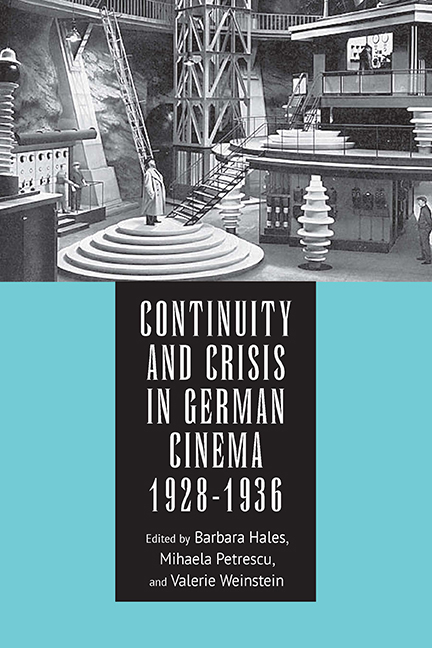Book contents
- Frontmatter
- Contents
- List of Illustrations
- Acknowledgments
- Introduction
- Part I Politics
- Part II The Economy
- Part III Concepts of Race and Ethnicity
- Part IV Genre Cinema
- Part V Making Cinema Stars
- Part VI Film Technologies
- Part VII German-International Film Relations
- Selected Bibliography
- Notes on the Contributors
- Index
13 - Playing the European Market: Marcel L’Herbier’s L’Argent (1928), Ufa, and German-French Film Relations
Published online by Cambridge University Press: 08 May 2021
- Frontmatter
- Contents
- List of Illustrations
- Acknowledgments
- Introduction
- Part I Politics
- Part II The Economy
- Part III Concepts of Race and Ethnicity
- Part IV Genre Cinema
- Part V Making Cinema Stars
- Part VI Film Technologies
- Part VII German-International Film Relations
- Selected Bibliography
- Notes on the Contributors
- Index
Summary
WHEN IN JUNE 1928 the Ufa star Brigitte Helm arrived in Paris, a crowd gathered at the train station to welcome the actress who had come to sudden fame through her debut in Fritz Lang's Metropolis (1927). Eighteen months after the German premiere of Metropolis in January 1927, and after no less than six more film roles, Helm had come to Paris to work with the film director Marcel L’Herbier, one of the central figures in French cinema at the time. She had been contracted, alongside Alfred Abel, the accomplished Ufa actor best known for his portrayal of the imperious ruler of Metropolis, Joh Fredersen, to play a leading role in L’Herbier's screen adaptation of Emile Zola's novel L’Argent (Money).
As astounding as it may seem at first glance to find two prolific German actors in this French motion picture, their participation illustrates the collaboration between Ufa, the German film industry's leading player, and the French film industry, which evolved in the second half of the 1920s. Collaborations such as the distribution of L’Argent in Germany by Ufa sowed the seeds for subsequent business ventures between the two European film industries, which turned out to be beneficial to Ufa before and after 1933. How did this engagement of Helm and Abel come about? What does it reveal about the specific nature of the German and French business interests at the time? What does it tell us about economic trends and technological challenges that affected Ufa and the French film industry, respectively, during this transitional period from 1928 onward? Considering these questions will give us insights into some of the continuities of Ufa's corporate politics between the Weimar years and the Nazi era and the film's connection to two of the pivotal crises of the transitional years—the economic crisis and the introduction of sound film.
Doing Business: Marcel L’Herbier, Ufa, and “Film Europe”
Marcel L’Herbier will prove with L’Argent that the French school has its proper qualities and that our country is entitled to a place of honor in the international film market.
- Type
- Chapter
- Information
- Continuity and Crisis in German Cinema, 1928-1936 , pp. 273 - 290Publisher: Boydell & BrewerPrint publication year: 2016

